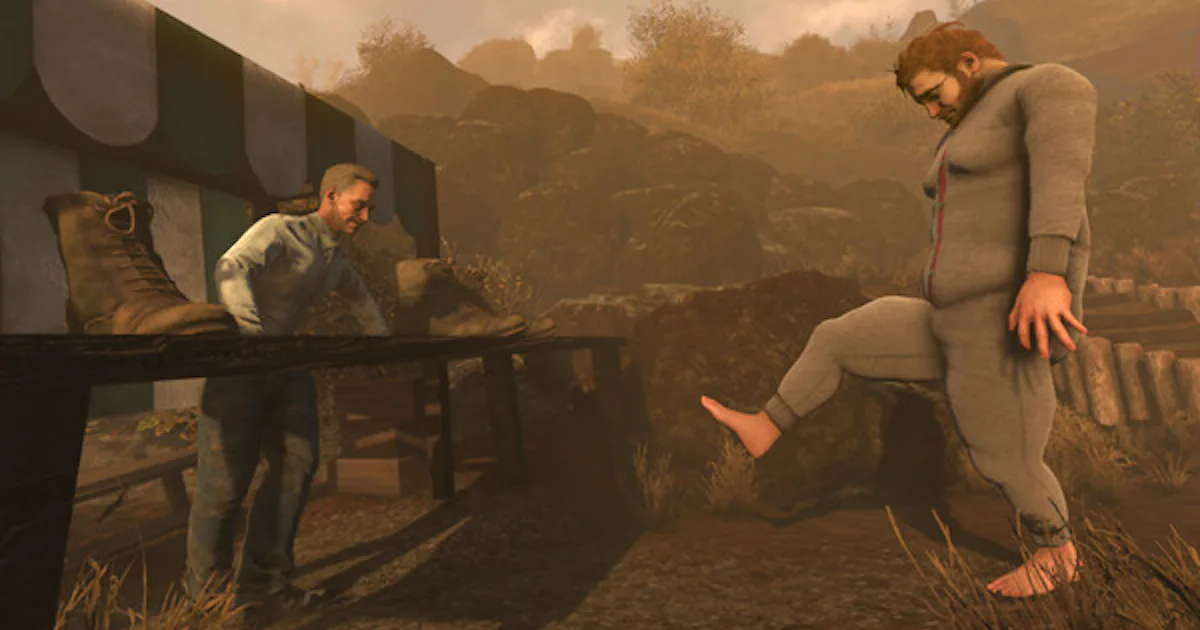
I spent most of my first hour of Baby Steps with my face planted in the ground. It’s not what I thought my first hour would be. After all, this is Bennett Foddy’s (the man behind other maddening games like the crossover hit QWOP and 2017’s Getting Over It) first “open world” game. Surely the philosopher-turned-designer would broaden his newest game’s appeal by curbing the unwieldy controls his games are known for.
I found out the hard way that this couldn’t be further from the truth. In reality, Baby Steps is an unapologetic successor to the memorable and meme-able games that came before it. It’s janky. It’s ugly, in an endearing kind of way. And it is, in moments, as entertaining as it is frustrating. Baby Step is another Foddy game that won’t be for everyone in the long term. But I deeply respect what’s sure to be 2025’s most bizarre game for committing to the bit.
The premise is simple. You play as Nate, an indecisive loser who is suddenly transported to a hilly, nature-filled landscape. To return home, he has to take control of the situation by doing the unimaginable — walking. In terms of concept, Baby Steps isn’t far removed from popular climbing games like Peak and Jusant, but adds its own torturous twist to the idea.
As we’ve come to expect from a game with Foddy’s name on it, the simple act of progressing forward is much, much harder than it sounds. Nate’s movement has four inputs. The left and right triggers control Nate’s left and right legs, the right stick controls the camera and Nate’s orientation, and the left analog stick determines Nate’s forward momentum. Walking forward requires an awkward bit of timing. Factor in rocky, uneven terrain, and you have one of the year’s most difficult games to master. And that’s in a year that saw Hollow Knight: Silksong and an Elden Ring spinoff.
Each chapter in Baby Steps requires Nate to make it to a camp some ways away from where he begins. To get there, you must trek through unforgivable obstacles that will punish you for any misstep. Narrow planks, steep hills, and slanted cliffsides were all cause for panic and fear in my four hours with the game so far. In the game’s opening level, I spent 10 minutes trying to overcome a waist-high wall just a few yards from my objective.
The game is impenetrable on purpose. Some of the earliest punchlines are about Nate outright refusing even the most minor of video game conveniences offered to him by other characters. There is no map or compass. No markers or ways to see what might be around the bend in front of you. There is no fast travel, power-ups, or landmarks to go by. You are venturing out into the wild, and the only way to know the right way is to pick a direction and find out for yourself.
Baby Steps is a test of one’s patience. After the first hour stumbling through the game’s controls, figuring out how to adjust for inclines, staircases, and waterways, I figured out how to walk steadily ten seconds at a time. Then 20. Then 30. By the second chapter, I learned that a foot planted flat on any surface works like an anchor, letting you carefully decide where your next step and all of your weight is going next.
There is something neat about how barebones Baby Steps game is. There is only ever one objective. The game’s overwhelming difficulty discourages pointless exploration (though there are plenty of secrets to be found in its world, according to its creators). And the barren levels and soundscapes mean your growth as a player takes center stage. Baby Steps is the walking simulator that people previously accused Death Stranding of being.
Still, I felt as though I had my fill of Baby Steps for the day anytime I’d lost a significant amount of progress for a third or fourth time. In the second chapter, for example, it’s possible to lose your balance while crossing a river. Slipping into the flowing body of water carries the possibility of being swept into the current, back down the mountain, all the way to the beginning of the level. While I grumbled all the way back up the mountain before eventually beating it, a similar end-level setback in the very next chapter had me closing the app in favor of another game entirely.
I suspect a more competitive-minded player will not give in as easily as I did. There is humor to be had in a game that trolls you as relentlessly as Baby Steps does. Heck, I suspect Baby Steps will be a massive hit on streaming platforms like Twitch and TikTok for this exact reason. But as someone less interested in this idea of frustration as a feature, Baby Steps is a game I’ll be playing in short spurts dictated by triumphs and deflating failures.
That being said, I truly appreciate what Baby Steps does well. It’s a game that takes its core idea and iterates on it endlessly. Spiraling paths and stairs cases I once found intimidating had become familiar enough in later levels that I marched over them with ease. And while I expected something a bit more inviting, the decision to make Baby Steps as impossible as 2008’s QWOP and unforgiving as 2023 viral hit Only Up takes the kind of guts I want to see more of in the indie space, regardless of my opinions of the game.
Lastly, there’s something to be said about the game’s humor. Cutscenes are sprinkled sporadically throughout the game and feature Nate awkwardly interacting with people much more capable than he is. These moments are sharply written, genuinely funny, and often helped to extinguish my ever-growing fury. It’s the one aspect of the game that feels distinct from the team’s past work and suggests a bright future if they want to continue making more story-driven games.
While I will be playing more of Baby Steps, I’m not entirely convinced the game is for me. It’s willing to punish you for the most accidental mistakes, and will waste your time for laughs, hoping you’ll be just as amused as its developers were. However, Baby Steps succeeds in accomplishing everything it sets out to do. Baby Steps may be an aggravating and trying quest to overcome adversity, but it’s also an intriguing one with vision and purpose, too.
Baby Steps is available now on the PlayStation 5 and PC.



